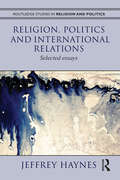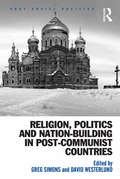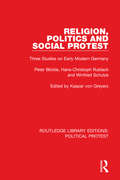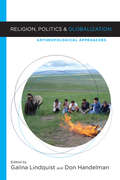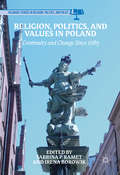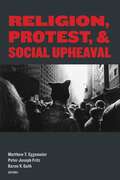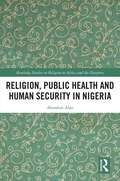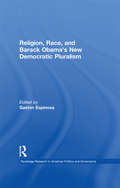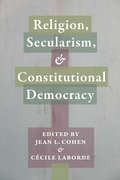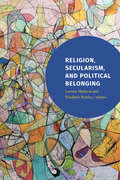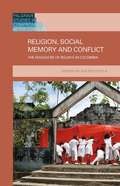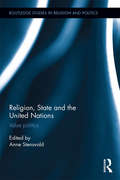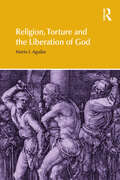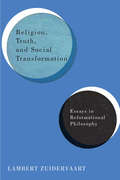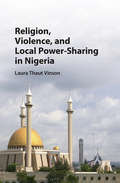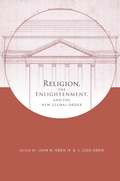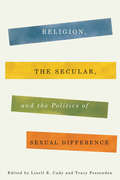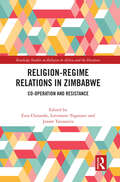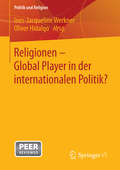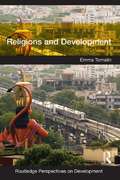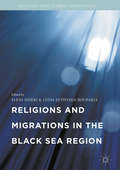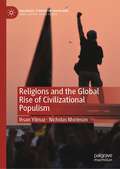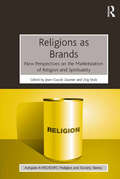- Table View
- List View
Religion, Politics and International Relations: Selected Essays (Routledge Studies in Religion and Politics)
by Jeff HaynesA leading authority in the discipline, Jeffrey Haynes has contributed to many of the most significant debates in the fields of religion & politics and religion & international relations in the last twenty years. This book brings together many of his most influential essays, offering a comprehensive analysis of religious actors and their political goals. In recent years, scholars have identified a range of religious actors with a variety of political goals. The aim of this collection is to identify and examine political activities of selected religious actors in both domestic and international contexts. The introductory chapter sets the scene for the collection, providing a clear understanding of why, how and when religious actors act politically both within and between countries. Over the course of 15 essays, Jeffrey Haynes presents a survey of the interaction of religion and politics, both domestically and internationally, in relation to a variety of issues, and draws the findings together in a new conclusion written for the volume. This work will be of great interest to the growing number of scholars and students and practitioners internationally who work on religion and politics, in both domestic and international contexts.
Religion, Politics and Nation-Building in Post-Communist Countries (Post-Soviet Politics)
by Greg Simons David WesterlundThe increasing significance and visibility of relationships between religion and public arenas and institutions following the fall of communism in Europe provide the core focus of this fascinating book. Leading international scholars consider the religious and political role of Christian Orthodoxy in the Russian Federation, Romania, Georgia and Ukraine alongside the revival of old, indigenous religions, often referred to as 'shamanistic' and look at how, despite Islam’s long history and many adherents in the south, Islamophobic attitudes have increasingly been added to traditional anti-Semitic, anti-Western or anti-liberal elements of Russian nationalism. Contrasts between the church’s position in the post-communist nation building process of secular Estonia with its role in predominantly Catholic Poland are also explored. Religion, Politics and Nation-Building in Post-Communist Countries gives a broad overview of the political importance of religion in the Post-Soviet space but its interest and relevance extends far beyond the geographical focus, providing examples of the challenges in the spheres of public, religious and social policy for all transitional countries.
Religion, Politics and Social Protest: Three Studies on Early Modern Germany (Routledge Library Editions: Political Protest #19)
by Peter Blickle Hans-Christoph Rublack Winfried SchulzeThis book, first published in 1984, brings together three essays written by specialists in German history of the sixteenth and seventeenth centuries whose important work is little known to English-speaking historians. Peter Blickle argues for a strong connection between the theology of the Reformation and the ideologies of the social protest movements of the period. Hans-Christoph Rublack takes a wider theme of the political and social norms in urban communities in the Holy Roman Empire and emphasises the ideas of justice, peace and unity held within the community despite the upheavals of revolution and protest. Winfried Schulze provides a comparative assessment of early modern peasant resistance within the Holy Roman Empire.
Religion, Politics, And Globalization: Anthropological Approaches (Berghahn Ser.)
by Galina Don HandelmanWhile social scientists, beginning with Weber, envisioned a secularized world, religion today is forthrightly becoming a defining feature of life all around the globe. The complex connections between religion and politics, and the ways in which globalization shapes these processes, are central themes explored in this volume by leading scholars in the field of religion. Does the holism of numerous past and present day cosmologies mean that religions with their holistic orientations are integral to human existence? What happens when political ideologies and projects are framed as transcendental truths and justified by Divine authority? How are individual and collective identities shaped by religious rhetoric, and what are the consequences? Can mass murder, deemed terrorism, be understood as a form of ritual sacrifice, and if so, what are the implications for our sensibilities and practices as scholars and citizens? Using empirical material, from historical analyses of established religions to the everyday strife of marginalized groups such as migrants and dissident movements, this volume deepens the understanding of processes that shape the contemporary world.
Religion, Politics, and Values in Poland: Continuity and Change Since 1989 (Palgrave Studies in Religion, Politics, and Policy)
by Sabrina P. Ramet and Irena BorowikThis volume brings together leading scholars to examine how the Church has brought its values into the political sphere and, in the process, alienated some of the younger generation. Since the disintegration of the communist one-party state at the end of the 1980s, the Catholic Church has pushed its agenda to ban abortion, introduce religious instruction in the state schools, and protect Poland from secular influences emanating from the European Union. As one of the consequences, Polish society has become polarized along religious lines, with conservative forces such as Fr. Rydzyk’s Radio Maryja seeking to counter the influence of the European Union and liberals on the left trying to protect secular values. This volume casts a wide net in topics, with chapters on Pope John Paul II, Radio Maryja, religious education, the Church’s campaign against what it calls “genderism,” and the privatization of religious belief, among other topics.
Religion, Protest, and Social Upheaval
by Matthew T. Eggemeier, Peter Joseph Fritz, and Karen V. GuthRepresents some of the best, cutting-edge thinking available on multiple forms of social upheaval and related grassroots movements.From the January 2017 Women’s March to the August 2017 events in Charlottesville and the 2020 protests for racial justice in the wake of George Floyd’s murder, social upheaval and protest have loomed large in the United States in recent years. The varied, sometimes conflicting role of religious believers, communities, and institutions in such events and movements calls for scholarly analysis. Arising from a conference held at the College of the Holy Cross in November 2017, Religion, Protest, and Social Upheaval gathers contributions from ten scholars in religious studies, theology and ethics, and gender studies—from seasoned experts to emerging voices—to illuminate this tumultuous era of history and the complex landscape of social action for economic, racial, political, and sexual and gender justice.The contributors consider the history of resistance to racial capitalist imperialism from W. E. B. Du Bois to today; the theological genealogy of the capitalist economic order, and Catholic theology’s growing concern with climate change; affect theory and the rise of white nationalism, theological aesthetics, and solidarity with migrants; differing U.S. Christian churches’ responses to the “revolutionary aesthetics” of the Black Lives Matter movement; Muslim migration and the postsecular character of Muslim labor organizing in the United States; shifts in moral reasoning and religiosity among U.S. women’s movements from the 1960s to today; and the intersection of heresy discourse and struggles for LGBTQ+ equality among Korean and Korean-American Protestants. With this pluralistic approach, Religion, Protest, and Social Upheaval offers a snapshot of scholarly religious responses to the crises and promises of the late 2010s and early 2020s. Representing the diverse coalitions of the religious left, it provides groundbreaking analysis, charts trajectories for further study and action, and offers visions for a more hopeful future.
Religion, Public Health and Human Security in Nigeria (Routledge Studies on Remote Places and Remoteness)
by Abiodun AlaoThis book critically examines the intersection of religion, public health and human security in Nigeria. Focusing on Christianity, Islam, traditional religions and "intra-religious" doctrinal divergencies, the book explores the impact faith has on health-related decisions and how this affects security in Nigeria. The book assesses the connection between religion and five contemporary major health and medical issues in the country. This includes the issue of epidemics and pandemics such as the Covid-19 pandemic, vaccines, contraception, blood transfusion and the controversies associated with "miracle healing". In particular, the book explores situations where individuals have the power of choice but instead, embraces faith and religious positions that contradict science in the management of their health and, in the process, expose themselves and others to personal health insecurity. It investigates aspects of human security including the wider international ramifications of health issues, approaches to cures and the interpretation of causes of diseases, as well as the ethno-religious connotations of such interpretations. Exploring key issues that have brought religion into the politics of health and human security in Nigeria, this book will be of interest to students and scholars in the field of African Religion, African Politics, African Studies, public health, security, and Sociology.
Religion, Race, and Barack Obama's New Democratic Pluralism (Routledge Research in American Politics and Governance)
by Gastón EspinosaContrary to popular claims, religion played a critical role in Barack Obama’s 2008 election as president of the United States. Religion, race, and gender entered the national and electoral dialogue in an unprecedented manner. What stood out most in the 2008 presidential campaign was not that Republicans reached out to religious voters but that Democrats did—and with a vengeance. This tightly edited volume demonstrates how Obama charted a new course for Democrats by staking out claims among moderate-conservative faith communities and emerged victorious in the presidential contest, in part, by promoting a new Democratic racial-ethnic and religious pluralism. Comprising careful analysis by leading experts on religion and politics in the United States, Gastón Espinosa’s book details how ten of the largest segments of the American electorate voted and why, drawing on the latest and best available data, interviews, and sources. The voting patterns of Mainline Protestants, Evangelicals, Catholics, Jews, Muslims, and seculars are dissected in detail, along with the intersection of religion and women, African Americans, Latinos, and Asian Americans. The story of Obama’s historic election is an insightful prism through which to explore the growing influence of religion in American politics.
Religion, Race, and the Making of Confederate Kentucky, 1830-1880
by Luke E. HarlowThis book sheds new light on the role of religion in the nineteenth-century slavery debates. In it, Luke E. Harlow argues that ongoing conflict over the meaning of Christian "orthodoxy" constrained the political and cultural horizons available for defenders and opponents of American slavery. The central locus of these debates was Kentucky, a border slave state with a long-standing antislavery presence. Although white Kentuckians famously cast themselves as moderates in the period and remained with the Union during the Civil War, their religious values showed no moderation on the slavery question. When the war ultimately brought emancipation, white Kentuckians found themselves in lockstep with the rest of the Confederate South. Racist religion thus paved the way for the making of Kentucky's Confederate memory of the war, as well as a deeply entrenched white Democratic Party in the state.
Religion, Secularism, and Constitutional Democracy (Religion, Culture, and Public Life #20)
by Cécile Laborde Jean CohenPolarization between political religionists and militant secularists on both sides of the Atlantic is on the rise. Critically engaging with traditional secularism and religious accommodationism, this collection introduces a constitutional secularism that robustly meets contemporary challenges. It identifies which connections between religion and the state are compatible with the liberal, republican, and democratic principles of constitutional democracy and assesses the success of their implementation in the birthplace of political secularism: the United States and Western Europe.Approaching this issue from philosophical, legal, historical, political, and sociological perspectives, the contributors wage a thorough defense of their project's theoretical and institutional legitimacy. Their work brings fresh insight to debates over the balance of human rights and religious freedom, the proper definition of a nonestablishment norm, and the relationship between sovereignty and legal pluralism. They discuss the genealogy of and tensions involving international legal rights to religious freedom, religious symbols in public spaces, religious arguments in public debates, the jurisdiction of religious authorities in personal law, and the dilemmas of religious accommodation in national constitutions and public policy when it violates international human rights agreements or liberal-democratic principles. If we profoundly rethink the concepts of religion and secularism, these thinkers argue, a principled adjudication of competing claims becomes possible.
Religion, Secularism, and Political Belonging
by Leerom Medovoi and Elizabeth BentleyWorking in four scholarly teams focused on different global regions—North America, the European Union, the Middle East, and China—the contributors to Religion, Secularism, and Political Belonging examine how new political worlds intersect with locally specific articulations of religion and secularism. The chapters address many topics, including the changing relationship between Islam and politics in Tunisia after the 2010 revolution, the influence of religion on the sharp turn to the political right in Western Europe, understandings of Confucianism as a form of secularism, and the alliance between evangelical Christians and neoliberal business elites in the United States since the 1970s. This volume also provides a methodological template for how humanities scholars around the world can collaboratively engage with sweeping issues of global significance.Contributors. Markus Balkenhol, Elizabeth Bentley, Kambiz GhaneaBassiri, David N. Gibbs, Ori Goldberg, Marcia Klotz, Zeynep Kurtulus Korkman, Leerom Medovoi, Eva Midden, Mohanad Mustafa, Mu-chou Poo, Shaul Setter, John Vignaux Smith, Pooyan Tamimi Arab, Ernst van den Hemel, Albert Welter, Francis Ching-Wah Yip, Raef Zreik
Religion, Social Memory and Conflict
by Sandra Milena Rios OyolaThe field of transitional justice and reconciliation considers social memory to be an important mechanism for acknowledging the violation of victims' rights and a step toward building peace. Societies in conflict, such as Colombia, challenge our current understanding of using memory in the construction of social peace processes, which in turn question the impossibility of forgiving violence that is still to come. Drawing on original ethnographical research, Rios analyses strategies of memorialization after the massacre of Bojay#65533;, Colombia, as an arena of political contention but also of grassroots resistance to persistent and diverse forms of violence. The book focuses on the work of the local grassroots Catholic Church and of the victims' association ten years after the massacre of Bojay#65533;. It explores the role of religion in the management of victims' emotions and in supporting claims of transitional justice from a grassroots perspective in a context of thin political transition.
Religion, State and the United Nations: Value Politics (Routledge Studies in Religion and Politics)
by Anne StensvoldThis volume approaches the UN as a laboratory of religio-political value politics. Over the last two decades religion has acquired increasing influence in international politics, and religious violence and terrorism has attracted much scholarly attention. But there is another parallel development which has gone largely unnoticed, namely the increasing political impact of peaceful religious actors. With several religious actors in one place and interacting under the same conditions, the UN is as a multi-religious society writ small. The contributors to this book analyse the most influential religious actors at the UN (including The Roman Catholic Church; The Organisation of Islamic Countries; the Russian Orthodox Church). Mapping the peaceful political engagements of religious actors; who they are and how they collaborate with each other - whether on an ad hoc basis or by forming more permanent networks - throwing light at the modus operandi of religious actors at the UN; their strategies and motivations. The chapters are closely interrelated through the shared focus on the UN and common theoretical perspectives, and pursue two intertwined aspects of religious value politics, namely the whys and hows of cross-religious cooperation on the one hand, and the interaction between religious actors and states on the other. Drawing together a broad range of experts on religious actors, this work will be of great interest to students and scholars of Religion and Politics, International Relations and the UN.
Religion, Torture and the Liberation of God (Religion and Violence)
by Mario I AguilarIf God can be used by the powerful to justify violence in the name of order, he can also be used by the weak to illuminate the position of the victims of political conflict. Religion, Torture and the Liberation of God explores the theological possibilities of a God who is a prisoner and a victim of torture. The book relocates God to the horrors of the military abuse of human rights in Chile and the systematic rape of women in the Democratic Republic of Congo. Aguilar argues that this theological exercise offers us new ways of understanding the abuse of power, whether it be the clerical abuse of children, violence against women, or homophobia. This examination of torture and rape becomes, through a theology of praxis and compliance, an examination of solidarity, love and affection. The book concludes with an exploration of the possibilities of a tortured God who liberates.
Religion, Truth, and Social Transformation: Essays in Reformational Philosophy
by Lambert ZuidervaartReformational philosophy rests on the ideas of nineteenth-century educator, church leader, and politician Abraham Kuyper, and it emerged in the early twentieth century among Reformed Protestant thinkers in the Netherlands. Combining comprehensive criticisms of Western philosophy with robust proposals for a just society, it calls on members of religious communities to transform harmful cultural practices, social institutions, and societal structures.<P><P> Well known for his work in aesthetics and critical theory, Lambert Zuidervaart is a leading figure in contemporary reformational philosophy. In Religion, Truth, and Social Transformation – the first of two volumes of original essays from the past thirty years – he forges new interpretations of art, politics, rationality, religion, science, and truth. In dialogue with modern and contemporary philosophers, among them Immanuel Kant, G.F.H Hegel, Martin Heidegger, Theodor Adorno, Jürgen Habermas, and reformational thinkers such as Herman Dooyeweerd, Dirk Vollenhoven, and Hendrik Hart, Zuidervaart explains and expands on reformational philosophy’s central themes. This interdisciplinary collection offers a normative critique of societal evil, a holistic and pluralist conception of truth, and a call for both religion and science to serve the common good. <P> Illustrating the connections between philosophy, religion, and culture, and daring to think outside the box, Religion, Truth, and Social Transformation gives a voice to hope in a climate of despair.
Religion, Violence, and Local Power-Sharing in Nigeria
by Vinson Laura ThautWhy does religion become a fault line of communal violence in some pluralistic countries and not others? Under what conditions will religious identity - as opposed to other salient ethnic cleavages - become the spark that ignites communal violence? Contemporary world politics since 9/11 is increasingly marked by intra-state communal clashes in which religious identity is the main fault line. Yet, violence erupts only in some religiously pluralistic countries, and only in some parts of those countries. This study argues that prominent theories in the study of civil conflict cannot adequately account for the variation in subnational identity-based violence. Examining this variation in the context of Nigeria's pluralistic north-central region, this book finds support for a new theory of power-sharing. It finds that communities are less likely to fall prey to a divisive narrative of religious difference where local leaders informally agreed to abide by an inclusive, local government power-sharing arrangement.
Religion, the Enlightenment, and the New Global Order (Columbia Series on Religion and Politics)
by J. Owen John Owen IvLargely due to the cultural and political shift of the Enlightenment, Western societies in the eighteenth century emerged from sectarian conflict and embraced a more religiously moderate path. In nine original essays, leading scholars ask whether exporting the Enlightenment solution is possible-or even desirable-today. Contributors begin by revisiting the Enlightenment's restructuring of the West, examining its ongoing encounters with Protestant and Catholic Christianity, Judaism, Islam, and Hinduism. While acknowledging the necessity of the Enlightenment emphasis on toleration and peaceful religious coexistence, these scholars nevertheless have grave misgivings about the Enlightenment's spiritually thin secularism. The authors ultimately upend both the claim that the West's experience offers a ready-made template for the world to follow and the belief that the West's achievements are to be ignored, despised, or discarded.
Religion, the Secular, and the Politics of Sexual Difference (Religion, Culture, and Public Life)
by Tracy Fessenden Linell E. CadyGlobal struggles over women's roles, rights, and dress increasingly cast the secular and the religious in tense if not violent opposition. When advocates for equality speak in terms of rights and modern progress, or reactionaries ground their authority in religious and scriptural appeals, both tend to presume women's emancipation is ineluctably tied to secularization. Religion, the Secular, and the Politics of Sexual Difference upsets this certainty by drawing on diverse voices and traditions in studies that historicize, question, and test the implicit links between secularism and expanded freedoms for women. Rather than position secularism as the answer to conflicts over gender and sexuality, this volume shows both religion and the secular collaborate in creating the conditions that generate them.
Religion,Culture and the State
by Pierre Anctil Howard AdelmanThe Canadian principle of reasonable accommodation demands that the cultural majority make certain concessions to the needs of minority groups if these concessions will not cause 'undue hardship.' This principle has caused much debate in Quebec, particularly over issues of language, Muslim head coverings, and religious symbols such as the kirpan (traditional Sikh dagger). In 2007, Quebec Premier Jean Charest commissioned historian and sociologist Gérard Bouchard and philosopher and political scientist Charles Taylor to co-chair a commission that would investigate the limits of reasonable accommodation in that province.Religion, Culture, and the State addresses reasonable accommodation from legal, political, and anthropological perspectives. Using the 2008 Bouchard-Taylor Report as their point of departure, the contributors contextualize the English and French Canadian experiences of multiculturalism and diversity through socio-historical analysis, political philosophy, and practical comparisons to other jurisdictions. Timely and engaging, Religion, Culture, and the State is a valuable resource in the discussion of religious pluralism in Canadian society.
Religion-Regime Relations in Zimbabwe: Co-operation and Resistance (Routledge Studies on Religion in Africa and the Diaspora)
by Lovemore Togarasei Ezra Chitando Joram TarusariraThis book explores religion-regime relations in contemporary Zimbabwe to identify patterns of co-operation and resistance across diverse religious institutions. Using co-operation and resistance as an analytical framework, the book shows how different religious organisations have interacted with Emmerson Mnangagwa’s "Second Republic", following Robert Mugabe’s departure from the political scene. In particular, through case studies on the Zimbabwe Council of Churches, Zimbabwe Catholic Bishops Conference and Pentecostals, African Traditional Religions, Islam, and others, the book explores how different religious institutions have responded to Mnangagwa’s new regime. Chapters highlight the complexities characterising the religion-regime interface, showing how the same religious organisation might co-operate and resist at the same time. Furthermore, the book compares how religious institutions co-operated or resisted Mugabe’s earlier regime to identify patterns of continuity and change. Overall, the book highlights the challenges of deploying simplistic frames in efforts to understand the interface between politics and religion. A significant contribution to global scholarship on religion-regime interfaces, this book will appeal to academics and students in the field of Religious Studies, Political Science, History and African Studies
Religionen - Global Player in der internationalen Politik?
by Ines-Jacqueline Werkner Oliver HidalgoDer Band untersucht das Agieren religiöser Akteure wie Religionsgemeinschaften und religiös basierte NGOs in der Weltpolitik und fragt nach den Potenzialen und Grenzen ihrer Einflussnahme. Erörtert werden theoretische und normative Aspekte im Verhältnis von Globalisierung, Global Governance und der Revitalisierung von Religion sowie Formen der transnationalen Kooperation zwischen den einzelnen Religionsgemeinschaften. Empirisch werden die für weltpolitische Ambitionen besonders prädestinierten abrahamitischen bzw. monotheistischen Religionsgemeinschaften in den Blick genommen. Auf dem Prüfstand steht die teilweise sehr brisante, ambivalente Rolle, die Christentum, Judentum und Islam im internationalen Kontext einnehmen. Zudem werden konkrete Politikfelder internationalen religiösen Engagements, deren Inhalte und Ziele vorgestellt wie die internationale Friedenspolitik, die Wirtschafts- und Sozialpolitik oder auch die Umweltpolitik.
Religions and Development (Routledge Perspectives on Development)
by Emma TomalinReligion has been excluded from development studies for decades. Religious traditions have contributed greatly towards development work, yet major international players have tended to ignore its role. Recent years have shown a noticeable shift in development policy, practice and research to recognize religion as a relevant factor. This text provides a comprehensive insight into different approaches towards the understanding the relationships between religions and development studies, policy and practice. It guides readers through current debates, presenting, explaining and critically evaluating a broad range of literature and locating it within a theoretical context. The text explores the role of religion within development, from positive contributions, such as the important role that many ‘faith-based organizations’ play in education or health care, to more complicated and contested notions of impact, such as religiously inspired violence or gender inequality. The book begins with three background chapters, outlining the relevance of religions for development studies, policy and practice, and introducing the reader to the study of ‘development’ and of ‘religions’. Following these, the focus then shifts to examine a number of thematic areas, including religion, gender and development, and the implications of the ‘rise of religion’ for mainstream development studies, policy and practice in the 21st century. Each chapter contains a range of features to assist undergraduate learning, including learning objectives for each chapter, discussion of key concepts, summaries, discussion questions, further reading and websites. The book also contains over sixty boxed case studies to provide further definition, explanation, and examples of the interactions between religions and development globally. This innovative text presents religions as something that can both obstruct and aid development, encouraging readers to engage critically with the multiple ways that religion impacts on both the conceptualization of development as well the resulting project interventions. This will be of interest to undergraduate, postgraduate students and scholars interested in religious studies, development studies, and the broader study of societies and cultures.
Religions and Migrations in the Black Sea Region (Religion and Global Migrations)
by Eleni Sideri and Lydia Efthymia RoupakiaThis book focuses on the interconnections of religion and migration in the Black Sea region through case studies that explore shifting identities, community, and national boundaries, as well as social practices and networks. During the past few decades the Black Sea has been transformed from a largely closed region, due to the Cold War, to a bridge for human, economic, and cultural capital flows. As the region opened up, understandings and practices of religion were re-signified due to new and diverse mobilities and resettlements. This volume addresses and responds to the current scarcity of academic research on the repercussion of political reform, migration, and modernization in the areas surrounding the Black Sea. Contributors uncover and examine the pivotal role of religion in current cultural contestations taking place in this strategic region. Engaging with a wide range of case studies, the book offers a fresh, comparative examination of migration as it relates to different countries and religious groups in the region.
Religions and the Global Rise of Civilizational Populism (Palgrave Studies in Populisms)
by Ihsan Yilmaz Nicholas MoriesonThis books explores the rise of civilizational populism throughout the world, and its consequences. Civilizational populism posits that democracy ought to be based upon enacting the ‘people’s will’, yet it adds a new and troubling dimension to populism’s thin ideology: a civilization based classification of peoples and division of society. Today, we increasingly find not conflict between civilizations, but conflict within states over their civilizational identity. From Western Europe to Turkey, and from India and Pakistan to Indonesia, populists are increasingly employing a civilization based classification of peoples in order to define the identities of ‘the people’ and their perceived enemies. This book is the first to examine civilizational populism as global phenomenon rather than a uniquely Western form of politics. Through a series of case studies, the book examines the role played by religion in forming civilizational identities, but also investigates the often deleterious consequences of civilizational populism entering the political mainstream.
Religions as Brands: New Perspectives on the Marketization of Religion and Spirituality (AHRC/ESRC Religion and Society Series)
by Jean-Claude Usunier Jorg StolzDuring the twentieth century, religion has gone on the market place. Churches and religious groups are forced to 'sell god' in order to be attractive to 'religious consumers'. More and more, religions are seen as 'brands' that have to be recognizable to their members and the general public. What does this do to religion? How do religious groups and believers react? What is the consequence for society as a whole? This book brings together some of the best international specialists from marketing, sociology and economics in order to answer these and similar questions. The interdisciplinary book treats new developments in three fields that have hitherto evolved rather independently: the commoditization of religion, the link between religion and consumer behavior, and the economics of religion. By combining and cross-fertilizing these three fields, the book shows just what happens when religions become brands.
